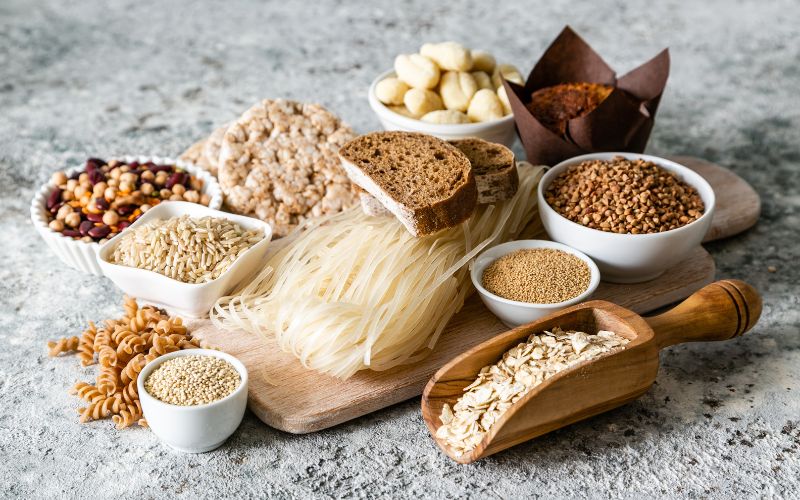Celiac disease: Gluten intolerance is a reaction of the body when you eat gluten, a protein in wheat, barley and rye.
When you have celiac disease, gluten causes a problem in your small intestine. Over time, this damages your lining and makes you unable to absorb some nutrients well (called malabsorption). This can cause diarrhea, tiredness, weight loss, bloating and anemia, and can also be serious.
In children, this poor absorption can affect their growth and development, in addition to causing the same problems as in adults.
There is no cure for celiac disease, but for many people, following a strict gluten-free diet can help control symptoms and help the gut heal.

Symptoms of gluten intolerance in children and adults
The symptoms of celiac disease (gluten intolerance) vary between children and adults. In adults, they can include digestive problems such as diarrhea, abdominal pain, bloating, and upset stomach. But more than half of adults with this condition have symptoms that are not related to the stomach, such as anemia, bone weakness, skin rashes, mouth ulcers, headaches, tingling in the hands and feet, balance problems , difficulties concentrating, joint pain and decreased spleen function.
Causes of gluten intolerance
Although it is not known exactly why it happens, a combination of genes, eating foods with gluten and other factors can cause celiac disease. The way we feed babies, stomach infections and intestinal bacteria can also be part of it. Sometimes celiac disease can flare up after surgery, pregnancy, viral infections, or times of high stress.
When our body's defense system overreacts to gluten in food, that reaction damages the small velvety parts that cover the small intestine, called villi. These villi are responsible for absorbing vitamins, minerals and other nutrients from what you eat. If they are damaged, you can't get enough nutrients, even if you eat a lot.

Foods not recommended for celiacs
As a celiac, foods containing wheat, barley, rye, and non-certified gluten-free oats should be avoided. These include bread, pasta, baked goods, beer, and some cereals. It is also crucial to read the labels of processed foods, avoiding sauces, dressings and prepared foods that may contain gluten. Opting for naturally gluten-free foods, such as fruits, vegetables, meats, fish, uncontaminated dairy products, and grains such as rice or quinoa, is key to a safe and healthy diet for those who suffer from this condition. Likewise, looking for foods labeled “gluten-free” is essential to prevent reactions.

Recommended foods for celiacs
As a celiac, it is safe to consume naturally gluten-free foods such as fruits, fresh vegetables, lean meats, fish, eggs, uncontaminated dairy, legumes and grains such as rice, quinoa, corn and tapioca. In addition, there are options for breads, pastas, flours and cereals certified as "gluten-free" available in specialized stores. It is essential to read labels carefully to ensure products do not contain hidden gluten. Opting for these certified gluten-free foods and variants helps maintain a varied and balanced diet while avoiding ingredients that could trigger health problems in people with gluten sensitivity.
Best Italian restaurant for celiacs in Seville
The San Marco Santa Cruz restaurant stands out as the best choice for lovers of Italian gastronomy looking for gluten-free options in Seville. Offering a wide range of dishes specially adapted for people with celiac disease, its menu includes options such as bread, a varied selection of pizzas (with the exception of calzone), tasty spaghetti dishes, delicious chocolate cakes and even beer suitable for celiacs. With its commitment to providing authentic and safe flavors for those with gluten sensitivity, San Marco Santa Cruz positions itself as a reliable and delicious option to enjoy Italian cuisine in Seville. You can take a look at his letter here.
Conclusion
In conclusion, celiac disease or gluten intolerance is more than a dietary condition; It is a lifestyle that requires special attention to the food consumed. As awareness of this condition increases, so do the options available to those who suffer from it. It is essential to understand the challenges and importance of a strict gluten-free diet to maintain health and quality of life. With increased knowledge, safe food options, and the support of conscious restaurants and communities, people with celiac disease can enjoy a full life and savor a wide range of delicious dishes, tailored to their needs. If you want more information you can consult the website of the Seville Celiac Association by clicking here.


